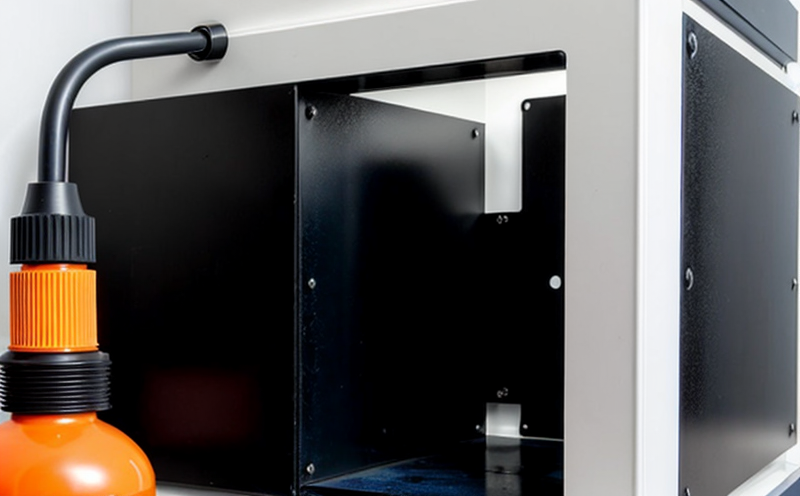ISO 1519 Mandrel Bend Test for Flexibility of Coatings
The ISO 1519 Mandrel Bend Test is a standardized procedure used to evaluate the flexibility and adhesion properties of coatings, particularly nanocoatings applied on surfaces treated with advanced materials. This test is crucial in ensuring that coatings adhere effectively during bending or flexing without delamination or cracking, which can be critical for the performance of many industrial applications.
The test involves applying a specified force to bend the coated specimen around a mandrel (a metal rod) of a given diameter and measuring how much the coating deforms. The primary objective is to determine if the coating remains intact under these conditions without any signs of separation from the substrate. This flexibility assessment is particularly important in industries where components may undergo significant mechanical stress, such as automotive manufacturing, aerospace engineering, or electronic device production.
The ISO 1519 Mandrel Bend Test ensures compliance with international standards and helps manufacturers verify that their coatings meet the required levels of flexibility for durability and performance. By using this test method, companies can ensure product reliability and enhance customer satisfaction by delivering products that withstand harsh environmental conditions or rigorous operational demands.
The process typically involves preparing a specimen according to specified dimensions and applying the coating in accordance with industry best practices. After curing, the coated samples are tested by bending them around the mandrel at a controlled temperature and rate of flexure. The results are then analyzed for any signs of delamination or damage, which indicate the flexibility and adhesion strength of the coating.
Understanding the requirements for ISO 1519 compliance is essential for quality managers, compliance officers, R&D engineers, and procurement professionals who need to ensure that their products meet international standards. The test provides critical insights into how well a coating will perform under real-world conditions, which can help in optimizing formulations and processes.
For instance, nanocoatings applied on surfaces treated with advanced materials require careful consideration of flexibility due to the high stress environments they may encounter. By using ISO 1519 Mandrel Bend Test data, manufacturers can make informed decisions about material selection and process optimization, ultimately leading to higher-quality products.
Furthermore, the test helps in identifying potential issues early in the development cycle, allowing for timely adjustments before full-scale production begins. This proactive approach not only enhances product quality but also reduces the risk of costly recalls or warranty claims. Compliance with ISO 1519 ensures that coatings are robust enough to withstand the rigors of industrial use and environmental exposure.
Understanding the flexibility properties through this test is vital for various sectors, including automotive, aerospace, electronics, and construction materials. For these industries, ensuring that nanocoatings adhere well under bending stress can mean the difference between a product's success or failure in the marketplace.
Eurolab Advantages
At Eurolab, we provide comprehensive ISO 1519 Mandrel Bend Testing for nanocoatings and surface treatments to ensure that your products meet the highest international standards. Our advanced facilities and experienced team of experts are dedicated to delivering accurate and reliable test results.
- State-of-the-Art Equipment: We use cutting-edge testing equipment that adheres strictly to ISO 1519 specifications, ensuring precise measurements and consistent results.
- Expertise in Nanocoatings: Our team has extensive experience in testing nanocoatings and surface treatments, providing deep insights into the flexibility of these materials.
- Comprehensive Reporting: We offer detailed reports that include all relevant test parameters, ensuring transparency and traceability for your product compliance needs.
The combination of our advanced equipment and experienced personnel allows us to provide accurate and reliable testing results. Our commitment to quality and precision ensures that you can trust Eurolab to meet your ISO 1519 Mandrel Bend Testing requirements.
Environmental and Sustainability Contributions
The ISO 1519 Mandrel Bend Test plays a significant role in promoting environmental sustainability by ensuring that coatings used in various industries are robust enough to withstand the rigors of industrial use without compromising performance. By testing for flexibility, this standard helps prevent waste associated with premature failure or delamination.
- Reduction in Waste: Ensuring that coatings adhere well through ISO 1519 Mandrel Bend Testing helps reduce waste by extending the lifespan of products and reducing the need for replacements.
- Enhanced Durability: Flexible nanocoatings tested according to this standard can enhance durability, leading to longer-lasting products that contribute positively to sustainability efforts.
The test also supports sustainable manufacturing practices by helping manufacturers optimize their processes and materials selection. By identifying coatings that perform well under bending stress, companies can reduce resource consumption and energy use throughout the product lifecycle.
Competitive Advantage and Market Impact
The ISO 1519 Mandrel Bend Test is a key factor in maintaining competitive advantage by ensuring that your products meet or exceed international standards. Compliance with this test can significantly impact your market positioning, as it demonstrates commitment to quality and reliability.
- Enhanced Product Reliability: By adhering to ISO 1519 Mandrel Bend Test specifications, you ensure that your coatings are robust enough for real-world applications, enhancing product reliability and customer satisfaction.
- Increased Market Demand: Demonstrating compliance with this standard can boost market demand by establishing trust and credibility among consumers and industry stakeholders.
In addition to these benefits, the test also supports innovation in nanocoatings and surface treatments. By testing for flexibility, manufacturers can identify areas for improvement and develop new formulations that meet or exceed current standards.
Overall, compliance with ISO 1519 Mandrel Bend Test is essential for maintaining a competitive edge in today's global market. It ensures that your products are reliable, durable, and sustainable, which can lead to increased market share and long-term success.





